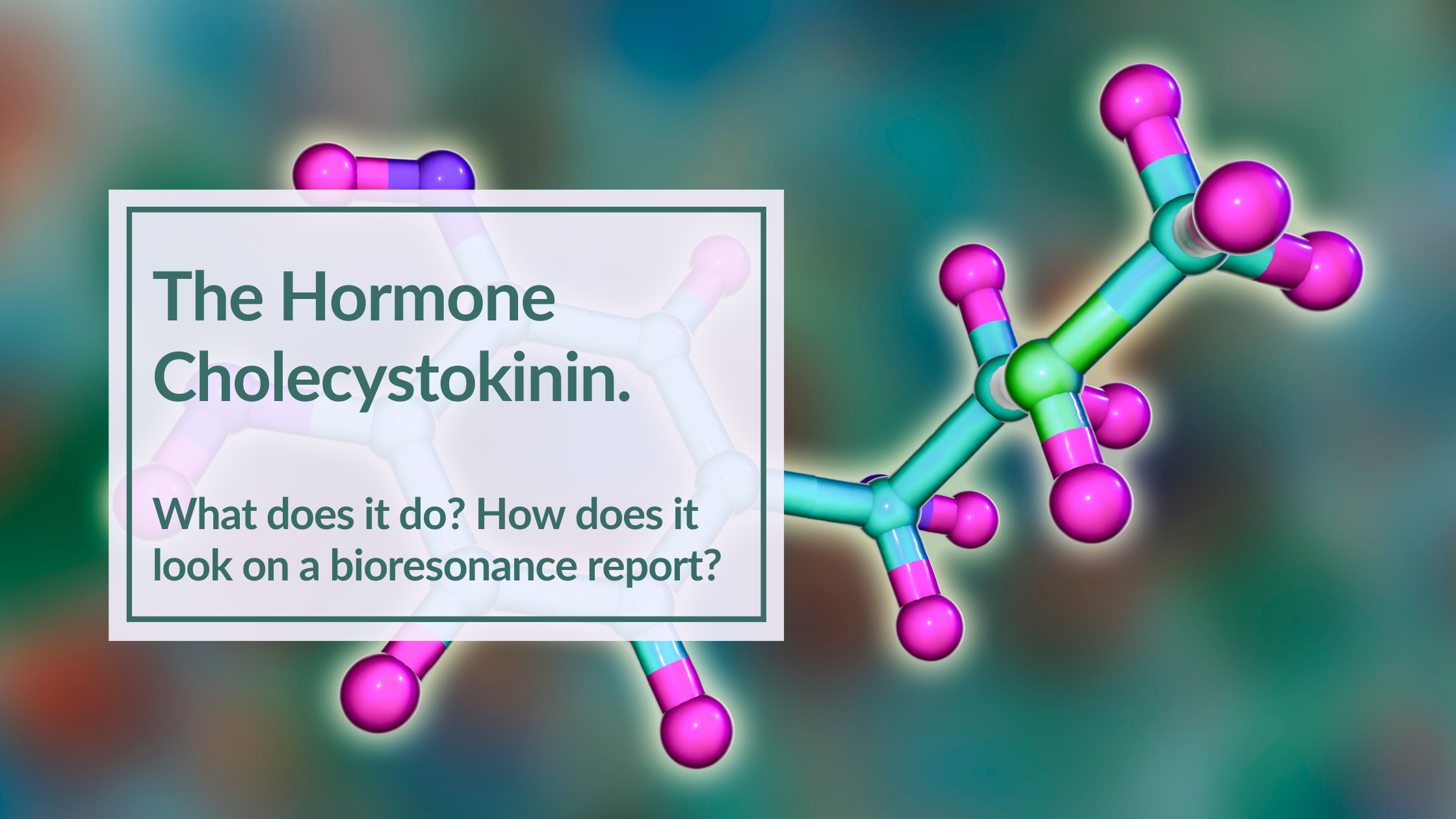
The hormone cholecystokinin can be confusing!
It’s not as prominent as the hormones cortisol, estrogen, progesterone, or testosterone! The hormone cholecystokinin (CCK) is a peptide hormone that plays an integral role in the Digestive System. It also has a role in the Nervous System.
In this post, we’ll cover both of these system connections and the significance of cholecystokinin in a bioenergetic report!
What is the Hormone Cholecystokinin?
This hormone is produced by specialized cells in the small intestine and released into the bloodstream in response to the presence of food, especially fat.
CCK acts as a messenger, relaying information between the gut and the brain to regulate various aspects of digestion and appetite. CCK can show up as high or low in the Energetic Hormonal Imbalances. You can see what these imbalances look like on our Sample Report.
What is the Hormone Cholecystokinin and the Digestive System Link?
CCK plays a pivotal role in the digestive system by stimulating the release of digestive enzymes from the Pancreas and bile from the gallbladder. When food enters the small intestine, CCK is released, signaling the Pancreas to secrete enzymes that aid in the breakdown of fats, proteins, and carbohydrates. Additionally, CCK causes the gallbladder to contract, releasing bile into the small intestine to facilitate the digestion and absorption of dietary fats.
How would this look on your bioenergetic test report?
Your Full Scan report might show stress in your:
- Pancreas
- Digestive System
- Small Intestine
- Gallbladder
You might also see any combination of digestive enzymes energetically imbalanced.
What Role Does the Hormone Cholecystokinin Play in Relation to Appetite?
One of the primary functions of the hormone cholecystokinin is the regulation of appetite and satiety. CCK acts as a satiety hormone, signaling to the brain that you are full and, perhaps, you should stop eating. This helps prevent overeating, which may contribute to weight issues. Here are three ways the hormone cholecystokinin is linked to appetite:
- CCK acts on the brain’s satiety centers, reducing appetite and promoting a feeling of fullness. The satiety center is located in the hypothalamus. If you see your hypothalamus show up as stressed on your bioenergetic report, along with low cholecystokinin, you may be having digestive stress and even increased cravings (1). Women in menopause are more likely to experience cravings because lower estrogen levels increase the hunger hormone ghrelin and decrease the appetite-suppressing effect of the hormone cholecystokinin (2).
- Without CCK, the release of digestive enzymes is slowed. This impacts digestion and the absorption of nutrients. If you are not absorbing nutrients, you may also experience increased cravings as your body seeks proper nourishment.
- CCK slows down gastric emptying, prolonging the feeling of fullness and delaying hunger. These combined effects help regulate food intake and promote healthy digestion.
What is the Hormone Cholecystokinin and the Nervous System Link?
There are receptors of CCK in the hypothalamus and brain stem nuclei that play a role in the interaction with the neurotransmitters dopamine, serotonin, and glutamate. There is also a link to hormones of the hypothalamus (3).
CCK is linked to anxiety and panic. It has neurotransmitter-like properties and can modulate behaviors, including reward-driven behaviors. This hormone has been found to have an anti-anxiety effect, promoting a sense of calmness and reducing stress-related behaviors (4).
Cholecystokinin may also modulate pain. This is done by targeting the receptor sites for pain control through manipulating dopamine release (5) (6).
Top Takeaways for the Hormone Cholecystokinin
In the Digestive System (7):
- Digestion supports by regulating the release of pancreatic enzymes to help in the digestion of fats, proteins, and carbohydrates.
- Causes contraction and relaxation of the gallbladder to release bile acids and aid in fat digestion in the small intestine.
- Regulates overall gut motility.
- Regulates emptying of the Digestive System.
- Stop gastric acid secretion after a meal by regulating gastrin production.
- Stimulation of cell growth.
- Energy production.
- Gene expression.
- Protein synthesis.
In the Nervous System
- Regulates feeding behavior and appetite.
- Managing anxiety.
- Pain perception.
Cholecystokinin (CCK) is a gut hormone that plays a significant role in the digestive system of all mammals. Its functions extend beyond digestion and include regulating appetite, satiety, and stress-related behaviors.
Maintaining a healthy balance of the hormone cholecystokinin involves supporting the Nervous System and the stress response, which in turn may have an effect on eating behavior, as overeating can be one way of coping with stress.
Eating protein and fat can also stimulate the release of this hormone. The fatty acids and amino acids promote the release, specifically.
When looking at specific hormones on your report, it is helpful to take a big picture approach, and support the stressed body systems, rather than the hormones singly. If you are curious about the overview of your own Full Scan, our three-part Masterclass series will give you an in-depth roadmap to navigating your Full Scan Experience.
